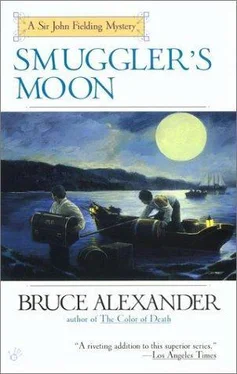Bruce Alexander - Smuggler's Moon
Здесь есть возможность читать онлайн «Bruce Alexander - Smuggler's Moon» весь текст электронной книги совершенно бесплатно (целиком полную версию без сокращений). В некоторых случаях можно слушать аудио, скачать через торрент в формате fb2 и присутствует краткое содержание. Жанр: Исторический детектив, на английском языке. Описание произведения, (предисловие) а так же отзывы посетителей доступны на портале библиотеки ЛибКат.
- Название:Smuggler's Moon
- Автор:
- Жанр:
- Год:неизвестен
- ISBN:нет данных
- Рейтинг книги:4 / 5. Голосов: 1
-
Избранное:Добавить в избранное
- Отзывы:
-
Ваша оценка:
- 80
- 1
- 2
- 3
- 4
- 5
Smuggler's Moon: краткое содержание, описание и аннотация
Предлагаем к чтению аннотацию, описание, краткое содержание или предисловие (зависит от того, что написал сам автор книги «Smuggler's Moon»). Если вы не нашли необходимую информацию о книге — напишите в комментариях, мы постараемся отыскать её.
Smuggler's Moon — читать онлайн бесплатно полную книгу (весь текст) целиком
Ниже представлен текст книги, разбитый по страницам. Система сохранения места последней прочитанной страницы, позволяет с удобством читать онлайн бесплатно книгу «Smuggler's Moon», без необходимости каждый раз заново искать на чём Вы остановились. Поставьте закладку, и сможете в любой момент перейти на страницу, на которой закончили чтение.
Интервал:
Закладка:
“What have been your relations with this man Eccles?”
“Not good, I should say. As Chief Customs Officer for this part of Kent, he has at his disposal a considerable force of men-over sixty at Dover Castle, where he has his headquarters, and more scattered in various towns up and down the coast.”
“How many in Deal?”
“Twenty, I believe. They are quartered at Deal Castle and report to the local customs officer, a man with whom I’ve cultivated good relations. My difficulties have been with his chief.”
He hesitated, frowned, and traced a pattern upon the desktop with his finger as he sought words to continue.
“Like most country magistrates, I have but two constables at my command,” said he, resuming. ”You, I believe, have a greater force-the Bow Street Runners, they are called.”
“I have been fortunate in that regard, yes, and that is because those in the government who apportion money wish to feel themselves safe in London,” said Sir John, ”And by the bye, though my constables be greater in number, they can never be sufficient to the task. London, it seems, will never be truly safe.”
“Be that as it may, sir, would you care to hazard a guess as to how many here in my jurisdiction in Deal are involved in the smuggling trade?”
“I couldn’t possibly put a number on it.”
”No less,” said Mr. Sarton, pausing for effect, ”than two hundred.”
It took Sir John a moment to respond. ”So many? I had not thought it could be so many.”
“I trust the figure,” said the young magistrate, ”for it was given me by the local customs officer, who grew up in Deal and has helped me on numerous occasions in ways his chief, Eccles, would never do.”
“Yes, Eccles-let us get back to you and your difficulties with him.”
“Yes, of course. Because these two constables are expected to keep order in the town and enforce the laws of the realm, et cetera, they are an insufficient number, pitifully insufficient, to do much to put down the smuggling trade here in this district. I saw that immediately I came here. And so I journeyed off to Dover to ask Mr. Eccles’s aid in patrolling the beaches known to be used by the smugglers. He said no, it was out of the question, for there was work enough to be done in the Dover area. But surely, said I, he could spare us at least a part of the force of customs men quartered here in Deal. Again no, said Mr. Eccles, for they had their duties to perform and could not be spared from them. There was no arguing with the man-I tried, but to no avail. He simply would give me no help whatever. And now, I learn from you, Sir John, that he has had the cold gall to accuse me of incompetence or corruption in the discharge of my duties.”
Mr. Sarton ended somewhat breathless. He could say little more in his own defense. And to me it seemed that little more need be said. Indeed I wondered if we might not return to London this very day. But Sir John seemed to have more in mind.
“Have you had no success in combating … what is it they call it here?”
“The owling trade. Yes, I have had-just once. It came through a tip given me by Sir Simon Grenville. He had heard through his servants at the manor house of the scheduled arrival of a shipment from France of wines and brandy on a certain night of the new moon. They made the crossing in one of those galleys which are built on the quiet right in Deal. I understand that they can make it here from Dunkirk, with twenty men rowing, in five hours’ time. They have a shallow draft and can land upon Goodwin Sands or most of the other beaches in the district. And with so many men working, they can be unloaded in no time at all. So there was no point trying to confront them on the beach. We three-my two constables and me-would have been hopelessly out-manned and out-gunned.”
He was warming to the subject, putting a good deal of drama into the telling of his tale.
“That was wise of you,” said Sir John. ”What then did you do?”
“Why, we waited till their two wagons were loaded and had started up the hill, and the galley was departed from the beach. We kept our silence and were well hidden, for we sorely needed the advantage that surprise would give us. We were but three in number, after all. We waited and waited and waited until they were just upon us.”
Reader, I had become acutely aware of the clock that hung upon the wall behind Mr. Sarton. According to it, I had barely five minutes in which to locate the Good King George in High Street, where I was to meet Mr. Perkins and hear his first report. How could I leave gracefully if Mr. Sarton insisted upon spinning out his story to absurd lengths? Would he never reach the conclusion?
But then, rather abruptly, he did end it: ”And then we jumped out at them and upon their wagons and persuaded them to stop.”
That, it seemed to me, was a weak ending to a strong story. Why had he cut it short? Then did I note the quick footsteps in the hall and saw how our host turned his attention past Sir John and me to the door that lay between us. I turned my attention to it just in time to see the putative Mrs. Sarton appear. She carried a tray, and upon it were three cups and a steaming pot which I took to be filled with dark tea a-brewing. Best of all, I spied a plate of sweet cakes and all manner of dainties, near as tempting to the eye as they would be to the palate. Her husband rose, as did Sir John and I.
“You two have already met my wife, Margaret, I believe.”
“We have,” said Sir John, with a stiff little bow, ”and a pleasure it was indeed.”
“Ah, you’re too kind, sir,” said she to him. ”I’ve just brought along some tea and cakes for all. I believe that talk goes better on a full stomach, don’t you?”
“Absolutely certain of it,” said Sir John.
She placed the tray upon her husband’s desk and busied herself pouring tea.
I realized that I now had my opportunity to leave. ”None for me, thank you.”
“Oh? And what would you prefer, young sir?” asked Mr. Sarton. ”Milk perhaps?”
“No, nothing at all. I’ve a matter to attend to on Sir John’s behalf. It should not take more than an hour.”
“Well then, be on your way. Quick to depart, quick to return.”
“I’ll show you out,” said Mrs. Sarton. ”But before I do, I would like to say to you, Sir John, and to you, young sir, that I have often heard that story told before by Albert-the one that he was telling just before I came in. But there is part of it that he always neglects to include at the end of it.”
“And what is that, Mrs. Sarton?” asked Sir John, clearly curious at what she might reveal.
“What Berty, that is, Albert, never tells is that he was badly wounded in the arm by a pistol ball. It shattered the bone, and it looked for a time that he might lose the use of that left arm altogether. I’ve asked him again and again to promise that he will take part no more in such battles, but so far I’ve yet to squeeze such a promise out of him.”
“Please, Molly,” said he, ”I can make no such promise. I’m sure Sir John understands that.”
“Well, whether he does or don’t, I intend to keep working until I get it from you, Berty.” Then, turning her attention to me: ”Come along, Mr. Proctor, if that’s your name. Oh, and at least take with you a cake or two. I made them myself, and so I know they’re good.”
I took her at her word, grabbed a scone, and was then ushered out of the room and to the street door. I asked her the way to the George in High Street, and as she gave directions, which were quite simple enough, I noted that her eyes glistened as though she might weep. Nonetheless, she managed to get the locks off and push me out the door before tears fell.
The scone was quite the best I had ever eaten.
Читать дальшеИнтервал:
Закладка:
Похожие книги на «Smuggler's Moon»
Представляем Вашему вниманию похожие книги на «Smuggler's Moon» списком для выбора. Мы отобрали схожую по названию и смыслу литературу в надежде предоставить читателям больше вариантов отыскать новые, интересные, ещё непрочитанные произведения.
Обсуждение, отзывы о книге «Smuggler's Moon» и просто собственные мнения читателей. Оставьте ваши комментарии, напишите, что Вы думаете о произведении, его смысле или главных героях. Укажите что конкретно понравилось, а что нет, и почему Вы так считаете.












